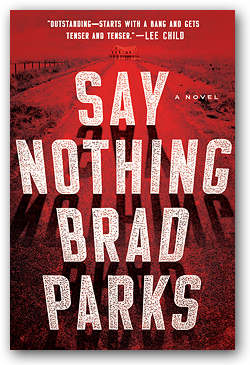
Dear Friends,
I've given the interns this newsletter off—after eight years, they've earned it—so I can write to you directly.
Today,
Say Nothing goes on sale nationwide. Thanks to the interns, you already know the novel has sold in thirteen countries and garnered fantastic reviews here in America.
What you perhaps don't know is how much
Say Nothing means to me. That's a deeply personal story—maybe too personal—but it's one I want to share with you, because it's true. And for however unfashionable this may be at the moment, the old journalist in me still believes the truth matters.
Before I began this project, I legitimately didn't know where I was heading as an author. Carter Ross was great and I loved writing him. But he was also buried in the back part of the bookstore, far from those bestsellers up front. It had been clear to me for some time that in order to progress my career, both creatively and professionally, I had to write a standalone.
So I did.
Three times.
I wound up throwing away all three. Each had their strengths. But they also had fatal flaws. To be candid, they just weren't good enough.
Writing manuscripts that fail is an occupational hazard for authors. But tossing three of them—roughly 1,200 pages and a year-and-a-half's worth of work, stretched over the course of three years—was both painful and disheartening.
It was also hell on my confidence. By late in the summer of 2014, I was starting to have real doubts about whether I'd ever be able to stick the landing. I kept cycling through plots that seemed just as destined for failure as the previous three.
Then one day I was out for a jog when advice from a writer friend came back to me:
You have to write the book that scares you, he said.
What scares me? I asked myself as I ran. Well, I'm a dad—it's really my most important job—so, of course, I thought of something happening to my kids. Like a kidnapping.
But why would someone want to take my (or some character's) children? Money, sure. But that's boring. What kind of character might have something else compelling a kidnapper couldn't get any other way?
Then, at a bend in the road about a mile from my house, it came to me: A judge. Someone takes his children and won't return them unless the judge issues a certain verdict in a high-stakes case.
I started writing that afternoon. Much as I had done with Carter Ross long ago, I made the judge sort of like me. He has two elementary-school-aged kids. He lives in rural Virginia. He adores his wife. He has this awesome job.
And then I took that idyllic life and systematically blew it up.
It made the writing both incredibly intense and emotionally exhausting. There were days when I came home from Hardee's, my usual writing haunt, feeling completely enervated.
There was no humor, like there sometimes is with Carter. There was simply no place for it. The stakes were too high.
I wrote the final scenes of the books with tears rolling down my cheeks. I also cried every time I edited it, even though by that point I already knew how it was going to end. The connection I had with the characters was that strong.
Then I went to get it published, feeling deep in my gut I had finally gotten it right.
No one else in my professional life seemed to feel the same way. The agent who had been with me for four books parted ways with me rather than represent it. The publisher who had been with me for six books didn't want to publish it.
Still, I believed—even if now my back was really up against the wall. In a lot of ways, a writer with no agent and no publishing contract isn't really an author anymore; he's an unemployed guy, sitting in a Hardee's with a laptop in front of him, telling people he's an author.
It took many long months—we're up to late summer 2015 by this point—to find an agent who wanted to take me on. When I did, I hit the jackpot: Alice Martell was not only fearsomely bright and a terrific editor, she was willing to work as hard as I was to get things right. She quickly became a trusted friend and an indispensable voice in my ear.
Together, we went back and forth with the manuscript for months. When we felt it was finally ready, she took it out into the marketplace. And, in less than two weeks (yes, Alice is that good), she landed me at a dream publishing house and what has turned out to be an ideal situation.
The people at Dutton Books—Jessica Renheim, Ben Sevier, Liza Cassity, Becky Odell, Elina Vaysbeyn, Christine Ball, and a whole lot of other highly dedicated professionals within the Penguin Random House empire—believed in this novel from the very beginning and have helped put it in an incredible position to succeed.
Just last week, I learned
Say Nothing is going to be on the front table of every Barnes & Noble in America.
And now, finally, I get to the best part: Sharing it. With you guys. That's a big part of what sustained me through the times when I was ready to give up. Because without you, none of this means a damn thing.
So I hope you read this book that has come to mean so much to me. And I hope you enjoy it. And if you cry at the end, please write a note and let me know. I'd love to hear about it—because, believe me, I was right there with you.
With Deepest Gratitude,



